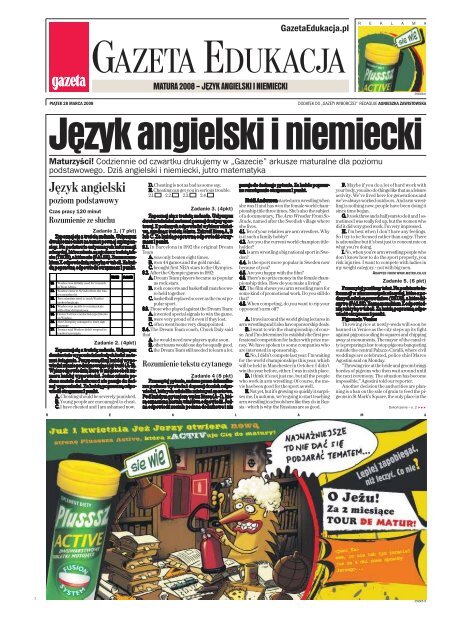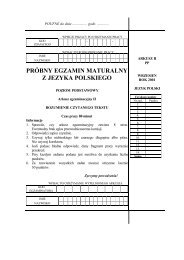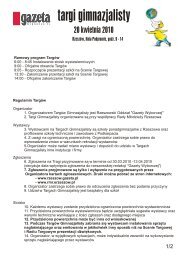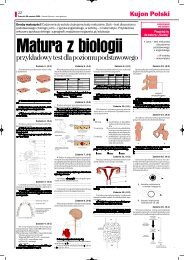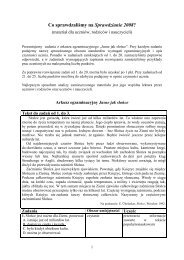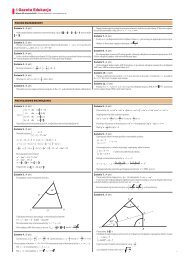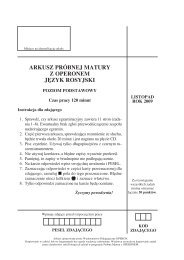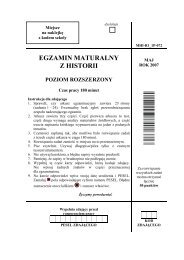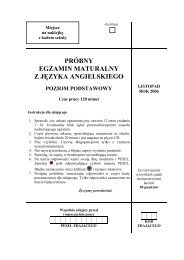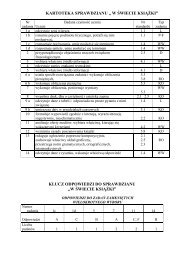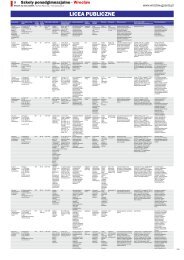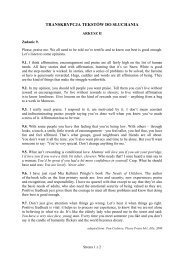Język angielski i niemiecki - Gazeta.pl
Język angielski i niemiecki - Gazeta.pl
Język angielski i niemiecki - Gazeta.pl
Erfolgreiche ePaper selbst erstellen
Machen Sie aus Ihren PDF Publikationen ein blätterbares Flipbook mit unserer einzigartigen Google optimierten e-Paper Software.
1<br />
<strong>Gazeta</strong>Edukacja.<strong>pl</strong><br />
GAZETAEDUKACJA<br />
MATURA 2008 –JĘZYK ANGIELSKI I NIEMIECKI<br />
R E K L A M A<br />
PIĄTEK 28 MARCA 2008 DODATEK DO „GAZETY WYBORCZEJ” REDAGUJE AGNIESZKA ZAWISTOWSKA<br />
<strong>Język</strong> <strong>angielski</strong> i <strong>niemiecki</strong><br />
Maturzyści! Codziennie od czwartku drukujemy w „Gazecie” arkusze maturalne dla poziomu<br />
podstawowego. Dziś <strong>angielski</strong> i <strong>niemiecki</strong>, jutro matematyka<br />
<strong>Język</strong> <strong>angielski</strong><br />
poziom podstawowy<br />
Czas pracy 120 minut<br />
Rozumienie ze słuchu<br />
Zadanie 1. (7 pkt)<br />
Zapoznaj się z treścią zadania. Usłyszysz<br />
dwukrotnie tekst na temat pewnej szympansicy.<br />
Na podstawie usłyszanych informacji<br />
zdecyduj, które zdania są zgodne z treścią tekstu<br />
(TRUE), a które nie (FALSE). Zaznacz znakiem<br />
X odpowiednią rubrykę w tabeli. Za każdą<br />
poprawną odpowiedź otrzymasz 1 punkt.<br />
1.1. Washoe was initially used for research<br />
in West Africa.<br />
1.2. Washoe came to Nevada when she was<br />
ten months old.<br />
1.3. Two scientists tried to teach Washoe<br />
spoken language.<br />
1.4. Washoe was unable to communicate<br />
with other chimpanzees.<br />
1.5. Doctor Terrace conducted experiments<br />
on Washoe.<br />
1.6. Nim Chimpsky managed to learn sign<br />
language.<br />
1.7. Terrace said Washoe didn’t respond to<br />
teacher’s prompts.<br />
TRUE FALSE<br />
Zadanie 2. (4pkt)<br />
Zapoznaj się z treścią zadania. Usłyszysz<br />
dwukrotnie wypowiedzi młodych ludzi na temat<br />
ściągania. Przyporządkuj każdej wypowiedzi<br />
zdanie podsumowujące jej treść (A-E).<br />
Wpisz odpowiednią literę w miejsce obok numeru<br />
każdej wypowiedzi. Jedno zdanie podane<br />
zostało dodatkowo i nie pasuje do żadnej<br />
wypowiedzi. Za każdą poprawną odpowiedź<br />
otrzymasz 1 punkt.<br />
A. Cheating should be severely punished.<br />
B. Young peo<strong>pl</strong>e are encouraged to cheat.<br />
C. I have cheated and I am ashamed now.<br />
D. Cheating is not as bad as some say.<br />
E. Cheating can get you in serious trouble.<br />
2.1. 2.2. 2.3. 2.4.<br />
Zadanie 3. (4pkt)<br />
Zapoznaj się z treścią zadania. Usłyszysz<br />
dwukrotnie tekst na temat pewnej drużyny sportowej.<br />
Z podanych odpowiedzi wybierz właściwą,<br />
zgodną z treścią tekstu. Zakreśl literę A, B<br />
lub C. Za każdą poprawną odpowiedź otrzymasz<br />
1 punkt.<br />
3.1. In Barcelona in 1992 the original Dream<br />
Team<br />
A. was only beaten eight times.<br />
B. won 44 games and the gold medal.<br />
C. brought first NBA stars to the Olympics.<br />
3.2. After the Olympic games in 1992:<br />
A. Dream Team <strong>pl</strong>ayers became as popular<br />
as rock stars.<br />
B. rock concerts and basketball matches were<br />
held together.<br />
C. basketball re<strong>pl</strong>aced soccer as the most popular<br />
sport.<br />
3.3. Those who <strong>pl</strong>ayed against the Dream Team:<br />
A. invented special signals to win the game.<br />
B. were very proud of it even if they lost.<br />
C. often went home very disappointed.<br />
3.4. The Dream Team coach, Chuck Daly said<br />
that<br />
A. he would need new <strong>pl</strong>ayers quite soon.<br />
B. other teams would one day be equally good.<br />
C. the Dream Team still needed to learn a lot.<br />
Rozumienie tekstu czytanego<br />
Zadanie 4 (8 pkt)<br />
Przeczytaj pytania, zadane przez dziennikarza<br />
podczas wywiadu i dopasuj do nich odpowiedzi,<br />
których udzieliła mistrzyni sportowa.<br />
Pod każdym pytaniem wpisz literę (A—I), którą<br />
oznaczona została właściwa odpowiedź. Jedna<br />
odpowiedź została podana dodatkowo i nie<br />
pasuje do żadnego pytania. Za każde poprawne<br />
rozwiązanie otrzymasz 1 punkt.<br />
Heidi Andersson started arm wrestling when<br />
she was 11 and has won the female world championship<br />
title three times. She’s also the subject<br />
of a documentary, The Arm Wrestler From Solitude,<br />
named after the Swedish village where<br />
she lives.<br />
4.1. Ten of your relatives are arm wrestlers. Why<br />
is it such a family hobby?<br />
4.2. Are you the current world champion titleholder?<br />
4.3. Is arm wrestling a big national sport in Sweden?<br />
4.4. Is the sport more popular in Sweden now<br />
because of you?<br />
4.5. Are you happy with the film?<br />
4.6. There’s no prize money in the female championship<br />
titles. How do you make a living?<br />
4.7. The film shows you arm wrestling men for<br />
some kind of promotional work. Do you still do<br />
that?<br />
4.8. When competing, do you want to rip your<br />
opponent’s arm off?<br />
A. I travel around the world giving lectures in<br />
arm wrestling and I also have sponsorship deals.<br />
B. I want to win the championship, of course.<br />
And I’m determined to establish the first professional<br />
competition for ladies with prize money.<br />
We have spoken to some companies who<br />
are interested in sponsorship.<br />
C. No, I didn’t compete last year. I’m waiting<br />
for the world championships this year, which<br />
will be held in Manchester in October. I didn’t<br />
win the year before, either. I was in sixth <strong>pl</strong>ace.<br />
D. I think it’s not just me, but all the peo<strong>pl</strong>e<br />
who work in arm wrestling. Of course, the movie<br />
has been good for the sport as well.<br />
E. Not yet, but it’s growing so quickly it surprises<br />
me. In autumn, we’re going to start teaching<br />
arm wrestling in schools here like they do in Russia<br />
– which is why the Russians are so good.<br />
F. Maybe if you do a lot of hard work with<br />
your body, you also do things like that as a leisure<br />
activity. We’ve lived here for generations and<br />
we’ve always worked outdoors. And arm wrestling<br />
is nothing new; peo<strong>pl</strong>e have been doing it<br />
since time began.<br />
G. It took three and a half years to do it and I sometimes<br />
I was really fed up, but the women who<br />
did it did very good work. I’m very impressed.<br />
H. I’m best when I don’t have any feelings.<br />
So I try to be focused rather than angry. There<br />
is adrenaline but it’s best just to concentrate on<br />
what you’re doing.<br />
I. No, when you’re arm wrestling peo<strong>pl</strong>e who<br />
don’t know how to do the sport properly, you<br />
risk injuries. I want to compete with ladies in<br />
my weight category – not with big men.<br />
ADAPTED FROM WWW.METRO.CO.UK<br />
Zadanie 5. (6 pkt)<br />
Przeczytaj poniższy tekst. Na podstawie informacji<br />
w nim zawartych zdecyduj, które z podanych<br />
zdań są prawdziwe (TRUE), a które fałszywe<br />
(FALSE). Zaznacz znakiem X odpowiednią<br />
rubrykę w tabeli. Za każdą poprawną odpowiedź<br />
otrzymasz 1 punkt.<br />
Pigeons in Venice<br />
Throwing rice at newly-weds will soon be<br />
banned in Venice as the city steps up its fight<br />
against pigeons soiling its squares and chipping<br />
away at monuments. The mayor of the canal city<br />
is preparing a law to stop pigeons banqueting<br />
outside the central Palazzo Cavalli, where civil<br />
weddings are celebrated, police chief Marco<br />
Agostini said on Monday.<br />
”Throwing rice at the bride and groom brings<br />
hordes of pigeons who then wait around until<br />
the next ceremony. The situation has become<br />
impossible,” Agostini told our reporter.<br />
Another decision the authorities are <strong>pl</strong>anning<br />
is a ban on the sale of grain to feed the pigeons<br />
in St Mark’s Square, the only <strong>pl</strong>ace in the<br />
R E K L A M A<br />
25956641<br />
Dokończenie – s. 2 uuu<br />
25956515
2 <strong>Gazeta</strong> Edukacja<br />
Piątek 28 marca 2008 1 <strong>Gazeta</strong> Wyborcza 1 www.gazetawyborcza.<strong>pl</strong><br />
uuuDokończenie ze s. 1<br />
city where it is still allowed. But the 18 licensed<br />
sellers do not want to go and animal rights<br />
activists have also expressed concern.<br />
”The square is not a hen-house and you<br />
can’t have pigeons’ droppings all over the <strong>pl</strong>ace,”<br />
Agostini said. ”The square is washed and<br />
cleaned up weekly but it’s not enough.”<br />
A recent study estimated that cleaning up<br />
monuments and repairing the damage caused<br />
by pigeons cost each Venetian taxpayer 275 euros<br />
a year.<br />
The battle against pigeons is part of a broader<br />
campaign to improve cleanliness in the<br />
city, which received nearly 20 million visitors<br />
last year. Since June, policemen have been patrolling<br />
St Mark’s Square and other historic<br />
sites and giving 25-euro fines on tourists who<br />
are found laying out a picnic, walking around<br />
bare-chested or dropping food wrappers.<br />
ADAPTED FROM WWW.ABC.NET.AU<br />
5.1. The mayor of Venice has<br />
introduced a law that will<br />
eliminate pigeons from the city.<br />
5.2. Wedding ceremonies attract big<br />
numbers of pigeons to Palazzo<br />
Cavalli.<br />
5.3. Some Venetians oppose the idea<br />
of getting rid of pigeons.<br />
5.4. Cleaning St. Mark’s Square of<br />
pigeons’ droppings would take a<br />
whole week.<br />
5.5. A single pigeon can cause damage<br />
worth 275 euros a year.<br />
5.6. Tourists in Venice may pay a fine<br />
if they are not fully dressed.<br />
TRUE FALSE<br />
Zadanie 6. (6 pkt)<br />
Przeczytaj poniższy tekst. Z podanych możliwości<br />
odpowiedzi wybierz właściwą, zgodną<br />
z treścią tekstu. Zakreśl literę A, B, C lub D.<br />
Za każdą poprawną odpowiedź otrzymasz<br />
l punkt.<br />
Countdown is one of the most popular quiz<br />
shows for puzzle lovers. It’s been on Channel<br />
4 for over 25 years. The show’s latest hostess,<br />
Carol Vorderman, with her IQ of 167 is<br />
rarely at a loss for an answer. But a short while<br />
ago, she was beaten to a mathematical problem<br />
by an 11-year-old schoolboy.<br />
After solving one of the show’s tricky number<br />
riddles, Bradley Cates, from Southport,<br />
was forced to slowly ex<strong>pl</strong>ain the answer to the<br />
red-faced Miss Vorderman. Now, following his<br />
TV success, state-school educated Bradley is<br />
set to undergo some numerical and verbal tests<br />
which will reveal his own IQ.<br />
Bradley’s mother, Caroline Wood, an assistant<br />
pub manager, said: ’Bradley was absolutely<br />
fantastic and I’m incredibly proud of him.<br />
It was stressful, of course, but I was far more<br />
nervous than he was. The whole thing has been<br />
a once-in-a-lifetime experience.’<br />
‘Since his success, peo<strong>pl</strong>e have been asking<br />
me whether I’ve had something done to<br />
try and work out Bradley’s IQ but I haven’t.<br />
He’s done all of this off his own back; I’ve not<br />
pushed him or anything. But maybe we should<br />
look into it now’<br />
Bradley, who first started watching the show<br />
two years ago with his granddad, John, prepared<br />
for the competition by watching televised<br />
re-runs and <strong>pl</strong>aying the official Countdown<br />
board game. He ap<strong>pl</strong>ied via e-mail last year<br />
and successfully com<strong>pl</strong>eted the programme’s<br />
rigorous audition process.<br />
Like Miss Vorderman, Bradley is also a keen<br />
sudoku fan and keeps his mind active by com<strong>pl</strong>eting<br />
awide range of puzzles and quizzes. An Everton<br />
fan, he attends his local, all-boys secondary<br />
comprehensive school, Birkdale High, which is<br />
rated ’excellent’ by educational authorities.<br />
Bradley will be given special dispensation<br />
from lessons this afternoon when, alongside his<br />
classmates, he will be allowed to watch his prerecorded<br />
winning performance on television.<br />
But his mother will also record the show<br />
just in case he is forced to attend lessons as<br />
normal.<br />
Miss Wood, 36, has invited various members<br />
of family, including Bradley’s grandfather,<br />
John, to her pub to watch the show.<br />
ADAPTED FROM WWW.THISISLONDON.CO.UK<br />
6.1. What is true about Countdown?<br />
A. Carol Vorderman has hosted it for over<br />
25 years.<br />
B. It’s meant for peo<strong>pl</strong>e interested in mysteries.<br />
C. School children rarely participate in it.<br />
D. Its hostess is an intelligent woman.<br />
6.2. Bradley Cates<br />
A. was forced to compete with Carol.<br />
B. embarrassed Carol during he show.<br />
C. wants to follow a career in television.<br />
D. had his IQ tested before the show.<br />
6.3. Caroline Wood<br />
A. did not force Bradley to enter the competition.<br />
B. thought Bradley was under too much stress.<br />
C. wanted her son to gain some experience.<br />
D. assisted her son in preparations for the<br />
show.<br />
6.4. Bradley prepared for the show<br />
A. watching the re<strong>pl</strong>ays of Countdown.<br />
B. practicing with his grandfather.<br />
C. <strong>pl</strong>aying online games.<br />
D. watching other TV shows.<br />
6.5. According to the text, Bradley<br />
A. goes to a high school in Everton.<br />
B. is considered an excellent student.<br />
C. attends a school in the neighbourhood.<br />
D. does sudoku as part of school programme.<br />
6.6. The best headline for this article would be<br />
A. Quiz Show Riddle Too Sim<strong>pl</strong>e.<br />
B. Schoolboy Pushed to Become Celebrity.<br />
C. Best Way to Test Your Intelligence.<br />
D. Schoolboy Defeats TV Presenter.<br />
Wypowiedź pisemna<br />
Zadanie 7. (5 pkt)<br />
Obchodziłeś ostatnio urodziny i zorganizowałeś<br />
dla znajomych imprezę w klubie. Napisz<br />
wiadomość, którą wyślesz e-mailem do koleżanki<br />
/ kolegi w Wielkiej Brytanii:<br />
1 Opisz, gdzie odbyła się impreza urodzinowa.<br />
1 Wyjaśnij, co zdecydowało o wyborze tego<br />
właśnie miejsca.<br />
1 Napisz, co było największą atrakcją wieczoru.<br />
1 Obiecaj niedługo przysłać zdjęcia.<br />
Podpisz się jako XYZ. W zadaniu nie jest określony<br />
limit słów. Oceniana jest umiejętność<br />
zwięzłego przekazu wszystkich informacji określonych<br />
w poleceniu (4 punkty) oraz poprawność<br />
językowa (1 punkt).<br />
Zadanie 8. (10 pkt)<br />
W czasie pobytu w Londynie ty i twoi znajomi<br />
wykupiliście wycieczkę w celu zwiedzenia<br />
kilku miejsc poza stolicą. Przebieg wycieczki<br />
odbiegał jednak od waszych oczekiwań. Napisz<br />
list ze skargą do biura podróży, w którym:<br />
1 poinformujesz o terminie i <strong>pl</strong>anowanym programie<br />
wycieczki,<br />
1 napiszesz, który punkt wycieczki został pominięty<br />
i co wam zaoferowano w zamian,<br />
1 skrytykujesz stan hotelu, w którym was zakwaterowano,<br />
oraz autokaru,<br />
1 pochwalisz przewodnika i wyjaśnisz, jakiej<br />
rekompensaty oczekujesz od biura.<br />
Pamiętaj o zachowaniu odpowiedniej formy<br />
listu. Nie umieszczaj żadnych adresów.<br />
Podpisz się jako XYZ. Długość listu powinna<br />
wynosić od 120 do 150 słów. Oceniana jest<br />
umiejętność pełnego przekazania informacji<br />
(4 punkty), forma (2 punkty), bogactwo językowe<br />
(2 punkty) oraz poprawność językowa (2<br />
punkty).<br />
Transkrypcja tekstów<br />
do słuchania<br />
Zadanie 1<br />
A world-famous chimpanzee believed to be<br />
the first animal to learn a human language died<br />
in Ellensburg on Tuesday night. Her name was<br />
Washoe, she was 42 years old and could use about<br />
250 American Sign Language signs.<br />
Washoe was born in 1965 in West Africa, where<br />
she was captured by the Air Force and brought<br />
to the United States, initially for research<br />
use in the space program. In 1966, when she was<br />
just ten months old, she left that program and<br />
began living in Nevada with two scientists, Allen<br />
and Beatrix Gardner. They tried to teach<br />
Washoe to communicate with peo<strong>pl</strong>e using the<br />
sign language. Previous efforts to teach chimpanzees<br />
spoken languages had failed, but the<br />
Gardners believed there was a better chance<br />
using signs. Washoe was very quick to learn, and<br />
her fame quickly spread.<br />
In 1980, she was moved to Central Washington<br />
University in Ellensburg, where she lived<br />
with three other chimps in a sanctuary that includes<br />
5,000 square feet of outdoor space.<br />
Washoe was able to teach another chimpanzee,<br />
Loulis, sign language without any human<br />
intervention. According to the scientists<br />
who worked with them, the chimpanzees were<br />
able to converse about feeling happy or sad,<br />
and could discuss objects that weren’t in the<br />
room. This caused a sensation in the scientific<br />
world.<br />
However, some researchers were still sceptical,<br />
claiming there was no evidence of Washoe<br />
or other chimpanzees using the sign language<br />
spontaneously. Columbia University<br />
scientist Doctor Herbert Terrace conducted<br />
his own experiments on another chimpanzee,<br />
called Nim Chimpsky. The chimp also learned<br />
sign language, but his use of the signs was not<br />
spontaneous. Terrace analyzed a video of Washoe<br />
and said he found evidence that she was<br />
just responding to teacher’s prompts, and not<br />
engaging in anything like human conversation.<br />
ADAPTED FROM WWW.SEATTLETIMES.NWSOURCE.COM<br />
Zadanie 2<br />
Speaker 1<br />
Every school has a cheating policy, and punishments<br />
can be pretty harsh. If you get caught<br />
cheating, you will not only fail the test, but sometimes<br />
you may even face getting kicked out<br />
of school. If you cheat to get a better grade, you’re<br />
taking a big risk of getting a much worse grade<br />
that will seriously set you back. Getting expelled<br />
from school will set you back even more.<br />
Speaker 2<br />
Cheating…who doesn’t know it? When you<br />
just can’t help peeking in you neighbour’s paper<br />
for an answer. Some peo<strong>pl</strong>e can resist it, others<br />
can’t. I’ve been tempted to cheat a few times.<br />
And I wasn’t always strong enough to resist.<br />
Perhaps I didn’t study the night before, or I just<br />
didn’t understand the material. Anyway, it’s always<br />
wrong and I feel bad about it.<br />
Speaker 3<br />
This whole cheating business is grossly exaggerated.<br />
It really isn’t such a big deal. After all,<br />
I’m not hurting anybody. And it’s not that I cheat<br />
to get top marks. I just boost my score a little<br />
bit to make sure I don’t fail. I can’t see why I should<br />
feel embarrassed. The other guys would do<br />
the same if they were smart enough.<br />
Speaker 4<br />
Cheating, deception and lies are accepted methods<br />
of getting things done these days, and the<br />
kids have a lot of exam<strong>pl</strong>es from their elders. The<br />
message is: ”the end justifies the means”. When<br />
you are confronted every day with stories of corruption<br />
at the top of our society, with traditional<br />
role models turning out unreliable and dishonest,<br />
you start thinking that perhaps you should do the<br />
same. So why would you want to achieve the hard<br />
way, when you can have it given to you on a <strong>pl</strong>ate?<br />
Zadanie 3<br />
The original Dream Team, the U.S. basketball<br />
team that won the gold medal at the 1992 Olympics<br />
in Barcelona, was a phenomenon on and off the<br />
court. It mattered not that it dominated the Olympic<br />
competition, beating its eight opponents by an<br />
average of 44 points. What was important was that<br />
the Dream Team, the first U.S. Olympic team to include<br />
NBA stars, gave fans a glimpse of basketball<br />
at its finest, and an entire world responded.<br />
After 1992, basketball ex<strong>pl</strong>oded in popularity<br />
around the globe, rising to a <strong>pl</strong>ace where it truly<br />
challenges soccer’s status as the world’s most popular<br />
sport. Much of that was due to the impact of<br />
the Dream Team, which attracted fans and followers<br />
wherever it went. ”It was like Elvis and the<br />
Beatles put together,” said Coach Chuck Daly. “Traveling<br />
with the Dream Team was like traveling with<br />
12 rock stars. That’s all I can compare it to.”<br />
Dream Team’s opponents didn’t have a chance<br />
on the court, but they didn’t care. During one<br />
match, a funny thing happened. One <strong>pl</strong>ayer, while<br />
trying to guard Magic Johnson, was seen frantically<br />
waving to a camera-wielding teammate<br />
on the bench, signaling to make sure he got a picture<br />
of them together.<br />
After his Dream Team won the gold medal,<br />
scoring 117-85 over Croatia in August 1992, their<br />
coach reflected: ”They knew they were <strong>pl</strong>aying<br />
against the best in the world. They’ll go home<br />
now and for the rest of their lives will be able<br />
to tell their kids, ’I <strong>pl</strong>ayed against Michael Jordan<br />
and Magic Johnson and Larry Bird.’ And<br />
the more they <strong>pl</strong>ay against our best <strong>pl</strong>ayers, the<br />
more confident they’re going to get.”<br />
The Dream Team coach then added: ”Finally<br />
there will come a day – I’m not saying it will<br />
happen anytime soon, mind you, but it’s absolutely<br />
sure that it will happen – that these teams<br />
will be able to compete with us on even terms.<br />
And they’ll look back on the games with the Dream<br />
Team as a stepping stone and one of the most<br />
important lessons in that process.”<br />
ADAPTED FROM HTTP://WWW.NBA.COM/HISTORY<br />
Matura bez stresu<br />
Do matury pozostał miesiąc. To dużo, bo życie<br />
w stresie nie należy do przyjemności. Z drugiej<br />
strony, czasu na gruntowne powtórki jest niewiele.<br />
Najważniejsze jednak: Don’t panic! Przekonaj<br />
się, ile już wiesz o egzaminie ustnym i pisemnym<br />
na poziomie podstawowym, wykonując test.<br />
Sprawdź, ile wiesz<br />
1. Egzamin ustny na poziomie podstawowym<br />
trwa: A 5 minut, B 10 minut, C 15 minut.<br />
2. Na przygotowanie się do odpowiedzi masz:<br />
A 5 minut, B 10 minut, C 15 minut.<br />
3. Pierwsze zadanie egzaminu ustnego polega<br />
na odbyciu tzw. rozmów sterowanych. Ile jest<br />
tych rozmów? A dwie, B trzy, C cztery.<br />
4. Drugie zadanie polega na: A opisie jednej ilustracji<br />
i odpowiedzi na 4-5 pytań, B opisie kilku<br />
ilustracji i odpowiedzi na 3-4 pytania, C opisie<br />
jednej ilustracji i odpowiedzi na 2 pytania.<br />
5. Egzamin pisemny na poziomie podstawowym<br />
trwa: A 60 minut, B 90 minut, C 120 minut.<br />
6. W części sprawdzającej rozumienie tekstu<br />
czytanego znajdują się: A 1-2 teksty, B 2-3 teksty,<br />
C 4 teksty.<br />
7. Na egzaminie pisemnym na pewno nie zostaniesz<br />
poproszon-y/a o napisanie: A CV, B listu<br />
z reklamacją, C ankiety.<br />
8. Dłuższy tekst użytkowy powinien mieścić się<br />
w limicie: A 100-120 słów, B 120-150 słów, C150-<br />
-180 słów.<br />
9. Na egzaminie pisemnym najwięcej punktów<br />
można uzyskać za rozwiązanie zadań sprawdzających:<br />
A rozumienie ze słuchu, B konstruowanie<br />
wypowiedzi pisemnych, C rozumienie<br />
tekstu czytanego.<br />
10. W ocenie wypowiedzi pisemnych (tekstów<br />
użytkowych) i ustnych najwyżej punktowane<br />
jest: A przekazanie informacji, B bogactwo językowe,<br />
C poprawność językowa.<br />
Klucz: 1. B, 2. A, 3. B, 4. C, 5. C, 6. B, 7. A, 8. B, 9. C, 10. A<br />
Jeśli odpowiedziałeś/aś poprawnie na co najmniej<br />
3 pytania z 10 to zdałeś/aś ten miniegzamin<br />
ze znajomości struktury i zasad oceniania matury.<br />
W naszym teście, tak jak na maturze, zdobycie<br />
30% punktów oznacza zaliczenie znajniższym wynikiem.<br />
Dla niektórych to już powód do radości,<br />
dla innych uczucie niedosytu. Czy na miesiąc przed<br />
egzaminem można jeszcze coś zrobić, aby uzyskać<br />
wymarzoną liczbę punktów? Ależ oczywiście, że<br />
tak. Jak mawiają Anglicy: Better late than never.<br />
Na naukę <strong>angielski</strong>ego od podstaw jest już niestety<br />
za późno, ale pozytywny wynik egzaminu zależy<br />
także od: 11 znajomości struktury egzaminu<br />
(patrz test powyżej), 11 opanowania strategii egzaminacyjnych<br />
(czyli jak rozwiązywać poszczególne<br />
zadania), 11 znajomości kryteriów oceniania<br />
(czyli jak zdobywać punkty).<br />
Ćwicz strategię rozwiązywania zadań<br />
egzaminacyjnych<br />
Czy aby zdać maturę wystarczy znać <strong>angielski</strong>?<br />
Doskonała znajomość <strong>angielski</strong>ego wcale nie<br />
musi oznaczać wysokiego wyniku na maturze.<br />
Okazuje się, że umiejętność zdawania egzaminu<br />
i znajomość strategii rozwiązywania poszczególnych<br />
zadań jest również ważna. Zacznijmy od paru<br />
ważnych – choć często ignorowanych – zasad.<br />
Tekstów możesz posłuchać na Matura.<strong>Gazeta</strong>.<strong>pl</strong><br />
11 Kontroluj czas trwania egzaminu. Cały egzamin<br />
trwa 120 minut, z czego 20 minut jest poświęcone<br />
zadaniom na rozumienie ze słuchu.<br />
Oznacza to, że na pozostałe części (rozumienie<br />
tekstu czytanego i wypowiedź pisemna) masz<br />
100 minut. Roz<strong>pl</strong>anuj je rozsądnie, np. na zadania<br />
sprawdzające rozumienie tekstu czytanego<br />
poświęć ok. 40 minut, a na napisanie i sprawdzenie<br />
tekstów ok. 60 minut.<br />
11 Nie staraj się za wszelką cenę rozwiązać<br />
całego zadania,zanim przejdziesz do kolejnego.<br />
Ten rodzaj perfekcjonizmu może okazać się zgubny<br />
– utknięcie nad pytaniem wartym 1 punkt może<br />
oznaczać brak czasu na pozostałe zadnia i niepotrzebny<br />
stres.<br />
11 Nie pozostawiaj pytań bez odpowiedzi. Nawet<br />
jeśli nie wiesz, strzelaj. W przypadku testu<br />
wielokrotnego wyboru masz minimum 25% szans<br />
trafienia. Gdy jest to test typu prawda/fałsz, twoje<br />
szanse rosną do 50%. To znacznie więcej niż<br />
Model odpowiedzi<br />
z języka <strong>angielski</strong>ego<br />
w jakimkolwiek konkursie SMS-owym!<br />
11 Przenieś wszystkie rozwiązania na kartę<br />
odpowiedzi. Pamiętaj, aby sprawdzić, czy odpowiedzi,<br />
które naniosł-eś/aś na kartę odpowiedzi,<br />
Zadanie 1<br />
to na pewno te, które zaznaczyłeś/aś w teście<br />
1.1. F, 1.2. T, 1.3. F, 1.4. F, 1.5. F, 1.6. T, 1.7. F<br />
i uznałeś/aś za poprawne. Podstawą naliczenia<br />
Zadanie 2<br />
punktów są rozwiązania umieszczone wyłącz-<br />
2.1. E, 2.2. C, 2.3. D, 2.4. B<br />
nie na karcie odpowiedzi, a nie w teście.<br />
Zadanie 3<br />
11 Nie ściągaj! Próba ściągania oznacza ko-<br />
3.1. C, 3.2. A, 3.3. B, 3.4. B<br />
niec egzaminu i 0% na świadectwie. Rozsądek<br />
Zadanie 4<br />
podpowiada zatem, by lepiej nie zaglądać do te-<br />
4.1. F, 4.2. C, 4.3. E, 4.4. D, 4.5. G, 4.6. A, 4.7. I, stu sąsiada.<br />
4.8. H<br />
Zadanie 5<br />
Jak rozwiązywać zadania zamknięte<br />
5.1. F, 5.2. T, 5.3. T, 5.4. F, 5.5. F, 5.6. T 11 Rozumienie ze słuchu. Przed pierwszym<br />
Zadanie 6<br />
wysłuchaniem tekstu przeczytaj uważnie pole-<br />
6.1. D, 6.2. B, 6.3. A, 6.4. A, 6.5. C, 6.6. D<br />
cenie do zadania egzaminacyjnego i zapoznaj się 1
1<br />
dokładnie z treścią zadania. Na podstawie treści<br />
zadania staraj się wywnioskować, jakiego typu<br />
informacje usłyszysz w nagraniu. Jeśli wykonujesz<br />
zadanie wielokrotnego wyboru i nie jesteś<br />
w stanie zdecydować, która odpowiedź jest poprawna,<br />
potraktuj każdy wariant odpowiedzi jako<br />
zadanie typu prawda/fałsz. Jeśli w zadaniu typu<br />
prawda/fałsz w usłyszanym tekście nie ma informacji<br />
potwierdzającej prawdziwość jakiegoś<br />
zdania, zaznacz je jako fałszywe. Pamiętaj też, że<br />
twoim zadaniem jest zdecydować, które zdania<br />
są zgodne z tekstem, a nie, które są obiektywnie<br />
prawdziwe lub z którymi się zgadzasz. Pamiętaj,<br />
że te same informacje w zadaniu i w słuchanym<br />
tekście mogą być wyrażone różnymi słowami,<br />
zwracaj uwagę na synonimy i wyrażenia o przeciwnym<br />
znaczeniu do tych, które są użyte w treści<br />
zadania. Słuchaj nagrania bardzo uważnie,<br />
nie daj się zwieść znajomym słowom.<br />
11 Rozumienie tekstu czytanego. Dla każdego<br />
tekstu roz<strong>pl</strong>anuj czas: pierwsze szybkie czytanie<br />
w celu uzyskania ogólnej informacji, następnie<br />
uważna lektura pytań, potem drugie, tym razem<br />
uważne czytanie tekstu, ana końcu zaznaczanie<br />
odpowiedzi. Przeczytaj uważnie polecenia do<br />
zadania. Przeczytaj także tytuł tekstu i zastanów<br />
się, jakie nasuwa on skojarzenia odnośnie do treści.<br />
Przeczytaj pobieżnie tekst, żeby zorientować<br />
się w jego tematyce i strukturze. Przy powtórnym<br />
czytaniu tekstu podkreśl te fragmenty, które pomogą<br />
ci wykonać zadanie. Rozwiązując zadaniu<br />
typu prawda/fałsz, pamiętaj, że jeśli w tekście nie<br />
ma informacji potwierdzającej prawdziwość jakiegoś<br />
zdania, należy je zaznaczyć jako fałszywe.<br />
Wykonując zadanie polegające na dopasowaniu<br />
fragmentów do luk w tekście, najpierw przeczytaj<br />
pobieżnie tekst. Następnie przeczytaj bardzo<br />
uważnie fragmenty umieszczone pod tekstem.<br />
Zwróć uwagę, zarówno w tekście, jak i w<br />
podanych fragmentach, na słowa i wyrażenia,<br />
które odnoszą się do poprzedniej lub następnej<br />
części. Wstawione zdania muszą także pasować<br />
do kontekstu, w którym je umieścisz. W zadaniach<br />
wielokrotnego wyboru dla każdego pytania<br />
sprawdź w tekście wszystkie proponowane<br />
odpowiedzi. Wybierz tę odpowiedź, która jest<br />
w pełni, a nie tylko częściowo zgodna z tekstem.<br />
Jak zdobywać punkty,<br />
pisząc teksty użytkowe<br />
W części Wypowiedź pisemna masz do napisania<br />
dwa teksty użytkowe: krótki (np. notatka lub<br />
8<br />
zlecenia<br />
do 1 kwietnia<br />
materiały<br />
do 2 kwietnia<br />
kwietnia<br />
wtorek<br />
zaproszenie) i dłuższy (list prywatny lub prosty<br />
list formalny) Wpierwszym przypadku ocenie podlega<br />
przekaz informacji (4 punkty) ipoprawność.<br />
(1 punkt). List oceniany jest także za przekaz informacji<br />
(4 punkty) i poprawność językową (2 punkty)<br />
oraz dodatkowo za bogactwo językowe i formę<br />
(po 2 punkty). Razem za obydwa zadania można<br />
uzyskać 15 punktów, z czego aż 8 punktów za<br />
poprawne przekazanie wymaganych wpoleceniu<br />
informacji, czyli za umiejętności pozajęzykowe,<br />
niezależne od poziomu znajomości języka.<br />
Oto kilka prostych zasad, dzięki którym masz<br />
pewność, że uzyskasz te punkty. Zawsze upewnij<br />
się, że przekazałeś/aś wszystkie wymagane<br />
informacje. W krótkiej formie użytkowej za przekazanie<br />
informacji możesz uzyskać 4 punkty,<br />
za poprawność językową jedynie 1 punkt, i to<br />
nie zawsze. Aby się o tym przekonać, przeanalizuj<br />
poniższe polecenie do zadania i przykładową<br />
odpowiedź.<br />
Zadanie<br />
Na kursie językowym w ramach dodatkowych<br />
zajęć organizujesz z kolegami cykl lekcji<br />
języka polskiego. Zredaguj krótkie zaproszenie<br />
dla innych uczestników kursu, w którym: 11 podasz,<br />
kiedy odbędzie się pierwsza lekcja, 11 poinformujesz<br />
o temacie pierwszej lekcji, 11 zachęcisz<br />
do udziału w zajęciach, 11 poprosisz<br />
o punktualne przybycie.<br />
Przykładowa odpowiedź:<br />
Come to room 17 on the first floor. During<br />
the course you will learn how to make a date in<br />
Polish. Come and enjoy our class. We promise<br />
a lot of fun! Please come on time.<br />
(Źródło: „Oxford Excellence for Matura”, Oxford<br />
University Press 2007)<br />
Za tę wypowiedź uczeń uzyskałby jedynie<br />
2 punkty. Dlaczego tylko dwa, skoro tekst jest<br />
bezbłędny? Otóż uczeń przekazał jedynie dwie<br />
informacje (trzecią i czwartą), za które otrzymałby<br />
2 punkty. Nie otrzymałby punktu za poprawność,<br />
gdyż otrzymuje się go w przypadku, gdy<br />
przekazane zostanie minimum wymaganych informacji,<br />
czyli co najmniej trzy z czterech.<br />
Podobne zasady naliczania punktów za treść<br />
stosuje się w dłuższej formie użytkowej.<br />
Gdy piszesz list, pamiętaj, aby zawierał on<br />
pięć wymaganych elementów formy.<br />
Ich obecność w liście jest osobno punktowana.<br />
Są to: 1. zwrot grzecznościowy rozpoczynający<br />
list prywatny/formalny, np. Dear Kate/Dear<br />
Sir, 2. wstęp typowy dla listu prywatnego/for-<br />
malnego, np. How are you?/ I am writing with<br />
reference to..., 3. rozwinięcie, 4. zakończenie typowe<br />
dla listu prywatnego/formalnego, np. Please<br />
write back./I am looking forward to hearing<br />
from you., 5. zwrot grzecznościowy kończący<br />
list prywatny/formalny, np. All the best/Yours<br />
faithfully.<br />
Po napisaniu listu sprawdź, czy mieści się on<br />
w limicie 120-150 słów. Przekroczenie tego limitu<br />
o więcej niż 10%, a także napisanie listu krótszego<br />
skutkuje utratą części punktów za formę.<br />
Pamiętaj, że skróty takie jak np. mustn’t liczą<br />
się jako dwa słowa. Na zakończenie jeszcze jedno<br />
<strong>angielski</strong>e przysłowie: Practice makes perfect,<br />
czyli ćwicz, ćwicz i jeszcze raz ćwicz, aby<br />
zdać jak najlepiej. Good luck!<br />
JOANNA SOSNOWSKA, NAUCZYCIELKA W I LO IM. ST.<br />
DUBOIS W KOSZALINIE, WSPÓŁAUTORKA „OXFORD EXCELLENCE<br />
FOR MATURA”, © OXFORD UNIVERSITY PRESS 2007<br />
<strong>Język</strong> <strong>niemiecki</strong><br />
Czas pracy 120 minut<br />
Za rozwiązanie wszystkich zadań łącznie<br />
można uzyskać 50 punktów.<br />
Rozumienie ze słuchu<br />
Zadanie 1. (9 pkt)<br />
Zapoznaj się ze zdaniami podanymi poniżej.<br />
Usłyszysz dwukrotnie fragment wypowiedzi<br />
młodzieży na temat domów starców. Na podstawie<br />
usłyszanych informacji zaznacz znakiem<br />
X w tabeli, do których osób odnoszą się informacje<br />
umieszczone w pierwszej kolumnie. Jedna<br />
informacja nie pasuje do nikogo, zostaw wtedy<br />
puste miejsce w tabeli. Za każde poprawne<br />
rozwiązanie otrzymasz jeden punkt.<br />
1. vergleicht das<br />
Altenheim mit einer<br />
Militäreinrichtung.<br />
2. macht sich zurzeit<br />
noch keine<br />
Gedanken darüber.<br />
3. glaubt, dass sich die<br />
alten Menschen dort<br />
nicht einsam fühlen.<br />
4. vermisst die Oma<br />
überhaupt nicht.<br />
I N F O R M A C J A D L A O G Ł O S Z E N I O D A W C Ó W<br />
ogólnopolskie wydanie Gazety Edukacja<br />
nietypowe kierunki studiów<br />
jak zdobyć zagraniczne stypendium?<br />
studia za granicą<br />
ZAPRASZAMY DO ZAMIESZCZANIA REKLAM!<br />
Ewa Maruszak, tel. 022 555 63 76<br />
ewa.maruszak@agora.<strong>pl</strong><br />
R E K L A M A<br />
25948360<br />
<strong>Gazeta</strong> Edukacja 3<br />
www.gazetawyborcza.<strong>pl</strong> 1 <strong>Gazeta</strong> Wyborcza 1 Piątek 28 marca 2008<br />
Tina Monika Eva Peter Sven Paula<br />
5. befürwortet die<br />
Altenheime nur<br />
dann, wenn die alten<br />
Menschen ein<br />
Pflegefall sind.<br />
6. findet, dass die<br />
Alten bei ihrer<br />
Familie wohnen<br />
sollten.<br />
7. geht oft zu Besuch<br />
dorthin.<br />
8. versucht im Leben<br />
nach den von den<br />
Großeltern<br />
beigebrachten<br />
Prinzipien zu<br />
handeln.<br />
9. will später<br />
unbedingt in einem<br />
Altenheim wohnen<br />
10. mag nicht von den<br />
Alten kritisiert<br />
werden<br />
Zadanie 2. (6 pkt)<br />
Zapoznaj się ze zdaniami podanymi poniżej.<br />
Usłyszysz dwukrotnie fragment prognozy pogody.<br />
Na podstawie usłyszanych informacji zdecyduj,<br />
które z podanych zdań są prawdziwe<br />
(richtig), a które fałszywe (falsch). Zaznacz znakiem<br />
X odpowiednią rubrykę w tabeli. Za każde<br />
poprawne rozwiązanie otrzymasz jeden punkt.<br />
1. Es kann heute regnen.<br />
2. Im Laufe des Tages wird es in<br />
München immer mehr Wolken<br />
geben.<br />
3. An der See wird es am wärmsten<br />
sein.<br />
4. Wetterfühlige Personen fühlen<br />
sich heute schlecht, weil sie zu<br />
lange Auto gefahren haben.<br />
5. Das Wetter verbessert sich in<br />
den kommenden Tagen.<br />
6. Es war der letzte Wetterbericht<br />
für heute.<br />
R F<br />
Rozumienie tekstu czytanego<br />
Zadanie 3. (7 pkt)<br />
Przeczytaj poniższe wypowiedzi. Z podanych<br />
odpowiedzi wybierz właściwą, zgodną<br />
z treścią tekstu. Zaznacz jedną z czterech moż-<br />
Dokończenie – s. 4 uuu<br />
R E K L A M A<br />
25858060
4 <strong>Gazeta</strong> Edukacja<br />
Piątek 28 marca 2008 1 <strong>Gazeta</strong> Wyborcza 1 www.gazetawyborcza.<strong>pl</strong><br />
uuuDokończenie ze s. 3<br />
liwości, zakreślając A, B, C lub D. Za każdą poprawną<br />
odpowiedź otrzymasz 1 punkt.<br />
Wie stellst du dir die Welt in 200 Jahren vor?<br />
11 Sebastian 15. Die Menschen werden auf<br />
fremden Planeten wohnen, weil es hier auf der<br />
Erde zu wenig Platz geben wird. Die Überbevölkerung<br />
wird zum größten Problem werden, deswegen<br />
werden die Erdbewohner in riesigen Wolkenkratzern<br />
leben, ohne Grünflächen, Wiesen<br />
oder Täler. An die Wälder werden sich nur die<br />
ältesten Personen erinnern können. Ich vermute,<br />
dass es sich nur die reichsten Menschen leisten<br />
werden, einen kleinen Garten anzubauen.<br />
Alles wegen des Platzmangels. Wir werden auch<br />
keine Wildtiere treffen können, weil sie aussterben<br />
werden. Ich freue mich, dass ich in solch einer<br />
traurigen Welt nicht leben muss.<br />
11 Sabine 19. Es wird zu einer Umweltkatastrophe<br />
kommen. Die meisten Tierarten werden<br />
ausgerottet sein und manche Pflanzen werden<br />
zu Kult-objekten. Wegen der globalen Klimaerwärmung<br />
schmelzen die Gletscher und<br />
der Meeresspiegel steigt. In naher Zukunft werden<br />
manche Küstengebiete wie Holland, New<br />
York oder Hawaii Inseln völlig überflutet werden.<br />
Überall kommt es zu Missernten. Alles wird<br />
auf den Kopf gestellt. Wegen der Luftverschmutzung<br />
werden die Menschen Schutzmasken tragen<br />
müssen und wegen des immer größer werdenden<br />
Ozonloches Schutzbrillen noch dazu.<br />
Heute verbringen die Menschen viel Zeit an der<br />
frischen Luft, weil man es für gesund hält. In der<br />
Zukunft wird man solch ein Benehmen Leichtsinnigkeit<br />
nennen. Die Menschen, denen viel<br />
an ihrer Gesundheit liegt, werden es vermeiden,<br />
nach draußen zu gehen.<br />
11 Mark 20. Alles wird so künstlich sein. Statt<br />
das Essen richtig zu genießen, werden die Leute<br />
blaue oder rote Pillen schlucken. Sie werden<br />
immer länger leben, weil die Medizin imstande<br />
sein wird, alle Krankheiten zu erforschen und<br />
ein Medikament dagegen zu erfinden. Da die<br />
Maschinen fast alle Aufgaben für die Menschen<br />
übernehmen werden, werden die meisten zu<br />
Hause sitzen, vor dem Computerbildschirm<br />
hocken und sich in der virtuellen Welt, von der<br />
sie schon im jungen Alter total abhängig werden,<br />
verirren. Solche Begriffe wie Freundschaft,<br />
Liebe, Leidenschaft oder Familienwärme verlieren<br />
an Bedeutung. Wegen der langen Lebenserwartung<br />
wird die Geburtenrate streng kontrolliert.<br />
Nicht allen Weltbürgern wird es erlaubt<br />
sein, Nachkommen zu haben. Nur die Auserwählten,<br />
also die schönen, klugen und starken<br />
werden dazu berechtigt sein. Es wird eine<br />
Alptraumwelt sein. Wenn wir heutzutage nichts<br />
gegen den Werteverlust unternehmen, werden<br />
unsere Enkelkinder zwar hübschen, aber gefühllosen<br />
Robotern ähneln.<br />
11 Max 18. Es kommt zu einem Zusammenstoß<br />
mit einer Sternschuppe oder vielleicht<br />
bricht ein Vulkan aus und überschüttet die ganze<br />
Erde mit einer dicken Aschenschicht.<br />
Wahrscheinlich auch ist der nächste Weltkrieg,<br />
weil die Menschen nichts aus der Geschichte<br />
lernen können und neue Waffen mit Spielsachen<br />
verwechseln. Eines Tages wird ein Fanatiker<br />
irgendwelchen strategischen Knopf drücken<br />
und nur die Kakerlaken werden es überleben.<br />
Ich bin nicht optimistisch eingestellt, was<br />
die Zukunft betrifft. All diese Hektik, der rasche<br />
technische Fortschritt gehen mir auf die Nerven.<br />
Ich würde lieber in der Vergangenheit, sogar<br />
im Mittelalter leben als in der Zukunft.<br />
11 Anna 19. Ich bin mir nicht sicher, was die Zukunft<br />
bringt. Hoffentlich neue Medikamente gegen<br />
AIDS; Krebs, Zuckerkrankheit. Wir werden<br />
via Internet kaufen, Studium abschließen, arbeiten.<br />
Es werden neue Städte auf dem Mond und<br />
in der Tiefe der Ozeane entstehen. Vielleicht finden<br />
wir irgendwo im All andere intelligente Lebensformen<br />
und diese Außerirdischen besuchen<br />
uns, natürlich ohne böse Absichten. Kein Mensch<br />
wird mehr hungern müssen, weil die Wissenschaftler<br />
neue, ergiebige Pflanzen schaffen. Es<br />
wird eine schönere Welt als die heutige sein.<br />
3.1. Für Sebastian wird die Welt der Zukunft<br />
A. eine tierfreundliche Zeit sein.<br />
B. großen Wert auf Weltraumreisen legen.<br />
C. mit Gedränge und Naturuntergang rechnen<br />
müssen.<br />
D. die Erfüllung seiner Träume sein.<br />
3.2. In Sebastians Vision<br />
A. wird es zu viele Menschen auf der Erde<br />
geben.<br />
B. wird sich ein kleiner Garten an jedem<br />
Wolkenkratzer befinden.<br />
C. werden nur die ältesten Menschen in<br />
den Wäldern wohnen dürfen.<br />
D. wird es genug Platz für Grünanlagen geben.<br />
3.3. Sabine glaubt, dass<br />
A. eine Umweltkatastrophe der Menschheit<br />
nicht droht.<br />
B. man zu Hause Schutzbrille tragen wird.<br />
C. manche Küstengebiete von der Landkarte<br />
verschwinden könnten.<br />
D. sich das Ozonloch nicht weiter verbreiten<br />
wird.<br />
3.4. Sabine warnt, dass<br />
A. zu viel frische Luft Krankheiten verursacht.<br />
B. die Zukunftsmenschen am liebsten nach<br />
draußen gehen werden.<br />
C. dass die Menschen ihre Gesundheit nicht<br />
hochschätzen werden.<br />
D. der Aufenthalt an der frischen Luft gesundheitsschädlich<br />
sein wird.<br />
3.5. Mark hat Angst, dass<br />
A. das Essenangebot immer breiter wird.<br />
B. die Menschen überarbeitet werden.<br />
C. die Menschen früher zu sterben beginnen.<br />
D. viele junge Leute computersüchtig werden.<br />
3.6. Nach Marks Meinung:<br />
A. werden alle Familien kinderreich sein.<br />
B. werden die Menschen immer gefühlloser.<br />
C. werden alle Menschen schön und klug<br />
sein.<br />
D. wird Freundschaft die größte Rolle spielen.<br />
3.7. Max glaubt, dass<br />
A. ein Krieg in der Zukunft ausgeschlossen ist.<br />
B. der rasche technische Fortschritt viele<br />
Vorteile mitbringt.<br />
C. eine Naturkatastrophe in der Zukunft<br />
wahrscheinlich ist.<br />
D. die Zukunft besser als die Vergangenheit<br />
sein wird.<br />
3.8. Annas Zukunftsvision ist optimistisch, denn<br />
A. sie hofft, dass man neue Arzneien entdecken<br />
wird.<br />
B. sie will auf den Mond reisen.<br />
C. die Außerirdischen bauen neue Städte in<br />
der Wassertiefe.<br />
D. sie mag neu geschaffene Pflanzen bewundern.<br />
3.1. 3.2. 3.3. 3.4. 3.5. 3.6. 3.7. 3.8<br />
Zadanie 4. (7 pkt)<br />
Przeczytaj tekst, z którego usunięto siedem<br />
kwestii. Spośród zdań A-H dobierz brakujące<br />
tak, aby otrzymać spójny i logiczny tekst. W każde<br />
wolne miejsce (4.1.-4.7.) wpisz literę, którą<br />
oznaczone zostało brakujące zdanie. Jedno z podanych<br />
zdań nie pasuje do tekstu. Za każde poprawne<br />
rozwiązanie otrzymasz jeden punkt.<br />
Wie alles begann…<br />
Journalist: Heute haben wir einen besonderen<br />
Gast in unserem Studio. Ich möchte allen<br />
Andreas Wolf vorstellen.<br />
Andreas: Servus. Leute!<br />
Journalist: Seit ein paar Monaten bist du mit<br />
deiner Gruppe die absolute Nummer Eins in<br />
der deutschen Hitparade. Noch vor einem Jahr<br />
hatte keiner Ahnung davon, dass es euch überhaupt<br />
gibt. ……………………………………….. 1........<br />
………………………………………..<br />
Andreas: Ich habe zufällig einen alten Kumpel<br />
aus der Grundschule getroffen und der<br />
erzählte mir, er würde einen Sänger für seine<br />
Band suchen. Da habe ich mich sofort bereit<br />
erklärt, bin zu einer Probe gekommen und so<br />
ging es los.<br />
Journalist: Ihr habt sehr schnell den Durchbruch<br />
geschafft. Viele sind talentiert und trotzdem<br />
brauchen mehrere Jahre, um berühmt zu<br />
werden. Bei euch ging alles wirklich blitzschnell,<br />
……… 2 ……………… oder habt ihr Bekannte in der<br />
Musikbranche?<br />
Andreas: Wir haben wirklich hart für unseren<br />
Erfolg gearbeitet. Rund um die Uhr lief bei<br />
uns alles auf Hochtouren und es ist noch heute<br />
so. Wir haben einfach unsere Chance genutzt,<br />
unser Bestes gegeben und es hat sich gelohnt.<br />
Journalist: Es klingt ja so schön, wie in einem<br />
Märchen…..<br />
Andreas: ……………… 3 ……………….? Unser Beispiel<br />
zeugt davon, dass man nicht aufgeben soll<br />
und dass man dank der harten Arbeit Träume<br />
erfüllen kann. Haben Sie etwas dagegen, dass<br />
man schnell vorankommt und dabei glücklich<br />
wird?<br />
Journalist: Auf gar keinen Fall, ich bin ja wohl<br />
neidisch auf Ihren spektakulären Erfolg und die<br />
schönen Mädchen, die Ihnen auf der Spur sind…..<br />
Davon träumen viele.<br />
Andreas:..................... 4 ....................., aber ich<br />
kenne auch viele Sänger die es satt haben, ständig<br />
nachspioniert zu werden. Ich kann mich an die<br />
Popularität auch nicht so leicht gewöhnen. Überall<br />
wird man angesprochen, nach Einzelheiten<br />
gefragt, nachgemacht und ……………………. 5<br />
……………..Manchmal tun mir meine Handgelenke<br />
so weh, aber ich weiß, dass ich es meinen Fans<br />
schuldig bin.<br />
Journalist: Ich muss Ihnen eine persönliche<br />
Frage stellen. Darf ich?<br />
Andreas: Wenn ich sie zu persönlich finde,<br />
werde ich nicht antworten. Schießen Sie!<br />
Journalist:.....................6.....................?<br />
Andreas: Tja, die Boulevardpresse hat gute<br />
Informatoren. Ich sage kurz: Sie ist fantastisch,<br />
blond, klug und ich liebe sie über alles. Reicht<br />
es Ihnen?<br />
Journalist: Ich werde sowieso nichts mehr<br />
von Ihnen erfahren, nicht wahr?.................7………..,<br />
hören einen Song von Ihrer letzten Platte und<br />
treffen uns mit unseren Zuhörern in zehn Minuten<br />
wieder. Danke schön.<br />
A. Seid ihr solche Glückspilze<br />
B. um Hunderte Autogramme gebeten.<br />
C. Stimmt es, dass Sie sich neulich verlobt<br />
haben<br />
D. Warum wundern Sie sich so<br />
E. Lügen haben kurze Beine.<br />
F. Wie hat es eigentlich begonnen?<br />
G. Mag schon sein<br />
H. Wir machen uns jetzt eine kurze Pause<br />
4.1.<br />
4.2.<br />
4.3.<br />
4.4.<br />
4.5.<br />
4.6<br />
4.7<br />
Zadanie 5. (5 pkt)<br />
Zapoznaj się ze zdaniami podanymi poniżej.<br />
Na podstawie przeczytanych informacji zdecyduj,<br />
które z podanych zdań są prawdziwe (richtig),<br />
a które fałszywe (falsch). Zaznacz znakiem<br />
X odpowiednią rubrykę w tabeli. Za każde poprawne<br />
rozwiązanie otrzymasz jeden punkt.<br />
Mein Lieblingsbuch<br />
„Doch nicht ohne meinen Vater“<br />
Es ist eine rührende Geschichte für alle Familienmitglieder,<br />
erzählt von der Perspektive<br />
eines kleinen elfjährigen Jungen, der während<br />
des Krieges in Kosovo sein Zuhause verliert und<br />
mit seiner Mutter nach Deutschland flüchtet.<br />
Hier geht er auf ein deutsches Gymnasium, wird<br />
von seinen Klassenkollegen gehänselt, ausgelacht<br />
und verprügelt. Er findet keine Freunde,<br />
denen er über seine Sehnsucht nach seinem Vater,<br />
der irgendwo in Kosovo mit den Feinden<br />
kämpft, erzählen könnte. So beginnt sich seine<br />
Vorstellungskraft zu entwickeln und der kleine<br />
denkt sich einen Freund aus. Im Laufe der Zeit<br />
gewöhnt sich der brave Omar an seine deutsche<br />
Umgebung, wird sogar von seiner Klasse akzeptiert,<br />
nachdem er einen literarischen Wettbewerb<br />
gewonnen hat. Die Familie bekommt auch<br />
den seit langem erwünschten Brief von dem Vater,<br />
der in einem UNO Krankenhaus liegt und<br />
bald nach Deutschland abtransportiert wird.<br />
Alles endet gut und der ausgedachte Freund<br />
geht weg. Omar braucht ihn nicht mehr.<br />
Das Buch ist in jeder Buchhandlung erhältlich<br />
und auch via Internet<br />
5.1. Der Held der Geschichte ist<br />
minderjährig.<br />
5.2. Seine ganze Familie flüchtet<br />
nach Deutschland.<br />
5.3. Omar wird von Anfang an bei<br />
seinen Kollegen beliebt.<br />
5.4. Der Junge hat einen<br />
imaginären Freund.<br />
5.5. Das Buch ist sowohl in der<br />
Buchhandlung als auch per<br />
Internet zu kaufen.<br />
Wypowiedź pisemna<br />
R F<br />
Zadanie 6. (5 pkt)<br />
Wybierasz się na wycieczkę klasową do Ber-<br />
lina. Napisz e-mail do kolegi z Niemiec, w którym:<br />
1 podasz termin <strong>pl</strong>anowanego wyjazdu,<br />
1 poinformujesz, gdzie zamierzacie nocować,<br />
1 poprosisz o wskazówki dotyczące zwiedzania,<br />
1 zapytasz o możliwość spotkania z nim w trakcie<br />
wycieczki.<br />
Podpisz się jako XYZ. W zadaniu nie jest<br />
określony limit słów. Oceniana jest umiejętność<br />
zwięzłego przekazu wszystkich informacji określonych<br />
w poleceniu (4 punkty) oraz poprawność<br />
językowa (1 punkt).<br />
Zadanie 7 (10 pkt)<br />
Ostatnio przeprowadziłeś się do nowego<br />
mieszkania. Napisz list do mieszkającej w Austrii<br />
znajomej, w którym:<br />
1 poinformujesz ją, kiedy i dokąd się przeprowadziłeś,<br />
1 poinformujesz ją, na którym mieszkasz piętrze<br />
i co najbardziej podoba ci się w nowym<br />
mieszkaniu,<br />
1 opiszesz okolicę i warunki komunikacyjne,<br />
1 zapytasz znajomą o jej wymarzony dom i zaprosisz<br />
do twojego nowego mieszkania.<br />
Pamiętaj o zachowaniu odpowiedniej formy<br />
listy. Nie umieszczaj żadnych adresów. Podpisz<br />
się jako XYZ. Długość listu powinna wynosić od<br />
120 do 150 słów. Oceniana jest umiejętność pełnego<br />
przekazu informacji (4 punkty), forma (2<br />
punkty), poprawność językowa (2 punkty) oraz<br />
bogactwo językowe (2 punkty).<br />
Transkrypcja tekstów<br />
do słuchania<br />
Zadanie 1<br />
„Was hältst du von den Altenheimen“?<br />
11 Tina 18. Eigentlich habe ich ja keine Ahnung<br />
davon. Ich bin erst 18,wissen Sie. In diesem Alter<br />
stellt man sich andere Fragen und denkt nicht<br />
an die weite Zukunft. Wenn mich das persönlich<br />
betreffen würde, dann hätte ich schon eine Meinung<br />
darüber. Fragen Sie mich mal wieder in<br />
50 Jahren, dann bekommen Sie eine klare Antwort.<br />
11 Monika 12. Ich besuche meinen Opa jedes<br />
Wochenende dort und er sieht ganz zufrieden<br />
aus. Er wird versorgt, hat sein eigenes Zimmer,<br />
viele Kameraden, mit denen er Schach spielt.<br />
Ich glaube nicht, dass er sich darüber beschweren<br />
würde. Wenigstens ist er nicht den ganzen<br />
Tag allein, was früher der Fall bei uns zu Hause<br />
war.<br />
11 Eva 17. Ich bin für das Konzept „Der Generationen<br />
unter einem Dach“. Alte Menschen sollten<br />
bei ihren Kindern wohnen und endlich ihr<br />
Leben genießen. Kinder, die ihre Eltern in einem<br />
Altenheim unterbringen, sind entweder<br />
undankbar oder phantasielos. Nirgendwo kann<br />
sich ein alter Mensch so gut fühlen, wie an Seite<br />
seiner Nächsten. Es steht für mich fest.<br />
11 Peter 19. Die Altenheime ähneln einer Militärkaserne,<br />
mit ihrer Tagesordnung und strengen<br />
Regeln. Warum sollten alte Menschen wie<br />
Soldaten behandelt werden? In ihren letzten<br />
Lebensjahren müssen sie vor allem Geborgenheit,<br />
Ruhe und Erholung finden. Ein Altenheim<br />
ist kein geeigneter Platz für den Rest des<br />
Lebens.<br />
11 Sven 22. Wenn eine alte Person bettlägerig<br />
ist und einer ärztlichen Betreuung rund um die<br />
Uhr bedarf, dann kann ich das Altenheim akzeptieren.<br />
In anderen Fällen ist das für mich<br />
ausgeschlossen. Ich kann es mir nicht vorstellen,<br />
dass ich meinem Opa so was antun könnte.<br />
Was für ein Enkel wäre ich? Eine egoistische,<br />
undankbare, herzlose Person. Meine Großeltern<br />
haben mich zum Glück anders erzogen<br />
11 Paula 15. Seit meine Oma in dem Altenheim<br />
lebt, habe ich mein eigenes Zimmer. Ich<br />
muss auch nicht mehr ihren ständigen Meckereien<br />
zuhören. Sie hat mich nur kritisiert und<br />
dumme Bemerkungen über meine Klamotten<br />
gemacht. Das ist typisch für die Alten, dass sie<br />
über die Jugendlichen herziehen. Jetzt wohnt<br />
meine Oma unter Ihresgleichen, kann dort die<br />
Klügste spielen. Mir reicht es, wenn ich sie zu<br />
Feiertagen sehe.<br />
Zadanie 2<br />
Sie hören jetzt den Wetterbericht.<br />
Heute ist es teilweise bewölkt und örtliche<br />
Regenschauer sind möglich, nur in Bayern wird<br />
es keinen Niederschlag geben und im Laufe des<br />
Tages können wir hier auf immer mehr<br />
Auflockerungen rechnen. München wird heute<br />
die wärmste Stadt in Deutschland sein.<br />
Der südliche Wind sorgt in ganz Deutschland<br />
für Tageshöchsttemperatur um 15 Grad, nur an<br />
der Küste bleibt es etwas kühler und hier kann<br />
der Wind ein wenig stärker sein.<br />
Bei wetterfühligen Personen können verschiedene<br />
Beschwerden auftreten. Wegen des<br />
heranziehenden Tiefdruckgebietes muss man<br />
mit Müdigkeit, Konzentrationsschwäche und<br />
Reizbarkeit rechnen. Es wäre abzuraten, längere<br />
Reisen mit dem Auto zu unternehmen.<br />
Prognose für die nächsten Tage.<br />
Das Wetter ändert sich allmählich. Es wird<br />
immer wärmer und heiter sein, nur im Westen<br />
werden noch vereinzelt Wolkenfelder durchziehen.<br />
Wir melden uns in drei Stunden wieder.<br />
Das waren die Wetternachrichten für<br />
Deutschland. 1<br />
Model odpowiedzi<br />
z języka <strong>niemiecki</strong>ego<br />
Zadanie 1<br />
1. – Peter, 2. – Tina, 3. -Monika, 4. – Paula, 5. – Sven,<br />
6. – Eva, 7. – Monika, 8. – Sven, 9 – nikt, 10. – Paula<br />
Zadanie 2<br />
1. R, 2. F, 3. F, 4. F, 5. R, 6. F<br />
Zadanie 3<br />
3.1. C, 3.2. A, 3.3. C, 3.4. D, 3.5. D, 3.6. B, 3.7. C,<br />
3.8. A<br />
Zadanie 4<br />
4.1. F, 4.2. A, 4.3. D, 4.4. G, 4.5. B, 4.6. C, 4.7. H<br />
Zadanie 5<br />
5.1. F, 5.2. F, 5.3. F, 5.4. R, 5.5. R<br />
1


